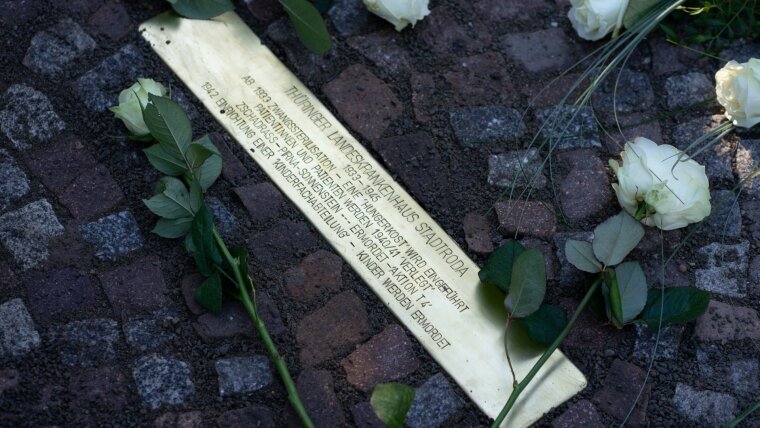
Published: | By: Stephan Laudien
On 9 November, victims of National Socialism are commemorated throughout Jena in the »Klang der Stolpersteine« (Sound of the Stumbling Blocks) event. Places of remembrance are primarily the Stolpersteine (stumbling blocks), which the Cologne artist Gunter Demnig has been laying throughout Europe since 1996 as memorials against forgetting. This year, however, there is a novelty: for the first time, the event will also focus on sites of crime in the city. These include buildings belonging to Friedrich Schiller University, such as Kahlaische Straße 1, where the »Institute for Human Hereditary Research and Racial Policy« was located from 1935.
The biology education specialist apl. Prof. Dr Uwe Hoßfeld also points to August-Bebel-Straße 4, once the seat of the Higher Hereditary Health Court, and the University Main Building (Fürstengraben 1). »The main building was home to Rector Karl Astel, who wanted to transform the University of Jena into a model SS university«, says Hoßfeld. Another memorial site is Bachstraße 18. Dr Karl Porges, also a biology education specialist at the University of Jena, recalls the sterilizations that were carried out in the former women's clinic during the Nazi era. »To this day, this group of victims is hardly recognized by the public«, says Porges. This makes civic engagement all the more important, far beyond 9 November.
The silence about the crimes continues to this day
Together with numerous other authors, Karl Porges has just published the book »NS-Eugenik-Verbrechen und ihre Folgen« (NS Eugenics Crimes and their Consequences), subtitled »Historische Analysen und pädagogische Impulse« (Historical Analyses and Educational Impulses) (Verlag Beltz Juventa 2025, 299 pages, ISBN 978-3-7799-9009-3). The book also discusses how to deal with sites of crime in Thuringia and presents biographical sketches of victims of the so-called »Aktion T4«; people who were classified as unworthy of life, disenfranchised and murdered. Karl Porges praised the initiative of three pupils from Stadtroda, who had a Stolperschwelle (stumbling threshold) laid as part of their term paper and will also participate in the »Klang der Stolpersteine«. »In doing so, they have further developed the culture of remembrance in their town and given the victims a voice«, says Karl Porges. After all, the silence about these crimes sometimes even persists in the families affected.
Addressing the biographies of the perpetrators
There was considerable controversy surrounding the decision to include the sites of the crimes in the city in the commemoration on 9 November, says Prof. Dr Gerhard Paulus. The physicist from the University of Jena initiated the »Klang der Stolpersteine« event in 2016 together with Till Noack and Klaus Wegener. »It is important to us to link the remembrance of the past with a look into the future«, says Gerhard Paulus. This means opposing racist and antisemitic opinions today. It is in the University's very own interest to stand up for an open-minded Thuringia, for the liberal democratic basic order. In the name of »Aryan physics«, all the principles of the subject were once rejected, and the expulsion and murder of Jewish scientists caused damage that continues to have an impact today. Educating people about such disastrous developments makes it necessary to also address the biographies of the perpetrators.
Sending a clear signal in favour of an open-minded Thuringia
The President of Friedrich Schiller University Jena, Prof. Dr Andreas Marx, explicitly welcomes the commitment of the staff: »The lesson of the past can only mean taking a firm stand against all forms of hatred and intolerance today. By remembering the injustices of the past, we are also sending a clear signal for an open-minded Thuringia«, sais Andreas Marx.